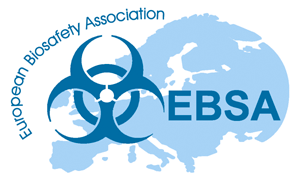Past EBSA events
-
 24 September 2025
24 September 2025ISO/TS5441:2024 Competence Requirements for Biorisk Management Advisors: what it is, how to use it
Read moreIn spring 2024, the International Organization for Standardization, ISO, published the technical specification ISO/TS5441:2024 Competence Requirements for Biorisk Management Advisors (BMA). ISO/TS5441 compiles all information on required knowledge, skills and experience a biorisk management advisor should have to provide competent advice to an organization under a given context, that is, based on the types of activities with biological material and their risk. ISO/TS5441 helps you to demonstrate and update your competence and it supports organization on how to define their competence need and how to choose a BMA. ISO/TS5441 has been designed by biosafety experts from different countries around the globe based on consensus, thus being a truly international specification.
The course will inform BMA of all degree of expertise and fields of activities on how ISO/TS5441 supports biorisk management advice activities. ISO/TS5441 can be purchased from national standardization organisations. The document cannot be shared as proprietary. However, this is not a prerequisite for attending the course.
-
 14 May 2025
14 May 2025Pre conference course H - Biosafety in a GMP World
MaastrichtRead moreGMP requirements are rooted in strict, non-negotiable legislation while biosafety relies on the nuanced art of risk assessment. These two domains share significant synergies but also harbor conflicts. Misalignment between GMP and biosafety standards can lead to facilities that fail to fully comply with biosafety, compromising containment design, improper airflow management, and increasing risk of carry-over of contamination and release.
-
 14 May 2025
14 May 2025Pre conference course G - Introduction to Behavior based (bio)safety and Human Factors risk assessment
MaastrichtRead moreThe behavior-based safety and human factors approach is a proactive and comprehensive strategy aimed at identifying and addressing at-risk behaviors in laboratory settings. This approach emphasizes the importance of individual behaviors in creating a safe work environment and preventing accidents and injuries.
-
 14 May 2025
14 May 2025Pre conference course A - Beyond safety – key professional skills throughout a career in biosafety / biosecurity
MaastrichtRead moreAdditional to technical knowledge, a successful career in biosafety or biosecurity requires a number of transferable professional skills. This course will give participants grounding and insight into key skills used by professionals in many areas, and examine how those impact upon a career in biosafety / biosecurity both generally and specifically.
-
 14 May 2025
14 May 2025Pre conference course I - Cell cultures for research and medical applications: risk-based prevention
MaastrichtRead moreAfter introducing the basic definitions, the course will cover two major topics: the strategy to identify cell culturesand the risks related to cell cultures and appropriate mitigation measures. Each part will involve interaction with participants, including a final short quizby groups of 3-4.
-
 13 May 2025
13 May 2025Pre conference course D - Fit for the future: How to address and manage potential risks of new biotechnologies
MaastrichtRead moreImagine you see yourself in a situation in which you have to decide on the biological risk classification of a new biologic and decide on the safety measures required to protect the people working in the lab and the environment and you have never come across any similar biologic, if it is biologic at all. This course is as much about risk assessment and risk management as it is about the process to find an answer and come to conclusions as well as dealing with uncertainty.
-
 13 May 2025
13 May 2025EBSA Conference 2025 and Preconference courses
MaastrichtRead more4 days in the Netherlands
-
 13 May 2025
13 May 2025Pre conference course E - BSL-3 Facilities: From Planning to Performance Verification (2 day course)
Utrecht and MaastrichtRead moreThe planning, design, construction and performance review of high containment facilities, including BSL-3, ABSL-3 and BSL-3Ag, requires a well thought out approach if the outcome is to meet the intentions of the owner or client and the users.
-
 13 May 2025
13 May 2025Pre conference course F - Biological Risk Assessment for Beginners – from paper to practice
MaastrichtRead moreAim: To be competent in undertaking biological risk assessment in an in vitro containment facility.
-
 13 May 2025
13 May 2025Pre conference course C - Biosecurity Risk Assessment
MaastrichtRead moreThis full-day course provides a comprehensive introduction to laboratory biosecurity principles, focusing on the practical application of risk assessment strategies. Participants will explore the WHO Laboratory Biosecurity Guidance, examining the connections and distinctions between biosecurity and biosafety.
-
 13 May 2025
13 May 2025Pre conference course B - Biorisk analysis in complex biorisk management settings: bowtie risk models in biorisk visualization and communication - Tie a bow and catch the butterfly
MaastrichtRead moreBiological risk assessments come in many kinds. Biosafety officers are the subject matter experts in their organization. How can they bring the risk assessment process to life and ensure risk assessments become living documents that support biorisk management and risk communication? The course explores problems and solutions in complex biological risk assessments. It provides practical instruction in the bowtie risk assessments as a reference method.
-

-
 13 March 2025
13 March 2025Large scale contained use - Polio certification in an eradication period
Read moreThe day will be dedicated to large scale contained use. This will be illustrated by sharing how the site has managed the Polio certification in an eradication period.
-
 06 December 2024
06 December 2024BSOH-BBP - Biosafety and Occupational Hygiene: Cross Perspectives on Biological Risks
AnderlechRead moreBiological agents can indeed be present in many sectors, not just in laboratories. Biosafety officers and occupational hygienists offer complementary perspectives on biological risks in the workplace.
What are their approaches? What tools do they use? What can we learn from each other?
Join us at the seminar on December 6, 2024, jointly organized by the BBP (Belgian Biosafety Professionals) and BSOH (Belgian Society of Occupational Hygiene), to learn more. This unique event will be an opportunity to explore how these two complementary approaches can be integrated to better prevent and manage risks related to biological agents in professional environments. -
 16 May 2024
16 May 2024EBSA Conference 2024 and Preconference courses
AntwerpRead more2 days of EBSA pre conference courses on Tuesday 14 and Wednesday 15 May 2024
2 days of EBSA conference on Thursday 16 and Friday 17 May 2024.
-
 15 May 2024
15 May 2024Pre conference course I - Synthetic Biology; from Mainstream to Counterculture – Theory, Practice & Safety
AntwerpRead moreThe course will provide an overview of the field of Synthetic Biology, ranging from mainstream developments, and applications, to the alternative DIYBio movement. Case studies will be used to illustrate key mainstream advancements in whole cell modelling, live synthetic cells, synthetic DNA, and CRISPR genome editing. The impact of biohacking and the garage biology movement will also be discussed.
The course is designed as an introduction to the field of Synthetic Biology for non-experts, and will be delivered through a mix of lectures, supporting videos and participant discussion.
-
 15 May 2024
15 May 2024Pre conference course H - Key challenges to assessing training & competency
AntwerpRead moreThe course will provide the information to understand how adults learn and apply this to strategies for training and assessing competency. During the course, instructors will explain the key challenges to training adults, how to understand learning preferences and identify training needs of individual or groups. In addition to that, participants will learn how to define and assess competences and how to analyse the suitability of a trainer.
-
 15 May 2024
15 May 2024Pre conference course G - Safety equipment in contained laboratories: from the biosafety cabinet to individual protection, a practical approach
AntwerpRead moreAfter introducing the basic concepts about individual and collective equipment, the training will focus on biosafety cabinets (BSC) with particular attention to defining the protection range and differences of each type of BSC. Factors affecting the effectiveness of the BSC (misuse, location, etc.) will be highlighted through a technical demonstration. The first part of the course will also describe some ways to decontaminate the BSC work surface and HEPA filters. The second part of this course will cover personal protective equipment, focusing on the main properties of masks and gloves. Beside explaining the criteria to consider when selecting the appropriate PPE, the training will use practical approaches to raise awareness of poor practices that could compromise the effectiveness of the PPE.
-
 14 May 2024
14 May 2024Pre conference course C - Field Biosafety perspectives on One Health: From sampling multiple species to working in a Mobile Lab
AntwerpRead moreWhen outbreaks of high-risk viral pathogens strike, aspects of laboratory diagnostics or research are often performed directly in the field, at the epicenter of the epidemic. What then, are the required biosafety precautions to apply and how can they be implemented under challenging conditions?
-
 14 May 2024
14 May 2024Pre conference course A - Biological Risk Assessment – from paper to practice
AntwerpRead moreIt is known that human reliability and behaviour have a major impact on an individuals ability to work safely in a laboratory; and yet these same factors can be overlooked when assessing the risks in that laboratory. This pre-conference course will take your risk assessments to the next level through ensuring that human reliability is accounted for in risk assessments and introduce the concept of safety critical task analysis.
This pre-conference course is aimed at those individuals who are already risk assessors or understand the risk assessment process and provide attendees with the skills and knowledge to complete safety critical task analysis. It will not only consist of theory sessions on risk assessment and human reliability but also a visit to teaching laboratories at ITM and so taking the biological risk assessment process from paper to practice.
